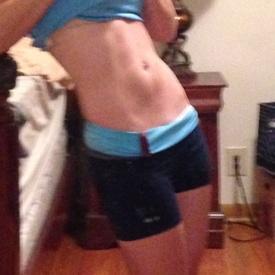Should we teach kids about calories?
Options
Replies
-
I don't think we should teach them calories. They should know about nutrition though. Teaching them that breakfast, lunch, and dinner are important parts of their growing bodies, and WHAT they put in their bodies is important. I think just telling them about calories is counterproductive.0
-
My kids see me counting calories, and have asked about it. I have a very firm "if you're old enough to ask, you're old enough for the answer" policy, so we DO talk about it. They do NOT count, but they know that I do, and they understand its because I let some bad habits creep in, and I'm trying to get and stay healthier than I was for a long time. We keep healthy snacks at home - lots of fruits and veggies and yogurt - but we also allow them to choose candy or high calorie snacks sometimes (I keep a candy jar in the top of my cupboard, and a cookie jar on my counter next to the fruit bowl). They know that the high calorie ones usually taste better, but the healthy ones taste great and keep you energized for longer. Kids will watch YOU, and what you are doing - EVERYTHING that you are doing shows your kids how to behave. So yes - in my house, we absolutely do talk about calories, but it's always framed in a way to help them understand nutrition and health.0
-
Yes. We should ALSO teach them about manners, respect for themselves, one another, and all living things, actual real math (not common core), handwriting, proper grammar, spelling and punctuation.
Yes!0 -
When my 7 year old and 5 year old asked me why I was scanning the peanut butter jar, I told them because I wanted to know how it fit into my healthy food choices.
We talk with them about how foods can affect how we feel, and that healthier food choices usually give us a better result.
We compare how we feel after eating McDonald's to how we feel after eating a home made meal of lean meats and veggies. We talk about hunger, energy, and the importance of eating a little bit of every food group.
I don't talk to them about exact calories, and what that means because for them it doesn't mean anything at this point.0 -
I don't teach my daughter about calories so much as I do moderation and proper portion sizes.0
-
I teach my kids that some foods are good for your body, and some foods aren't as good for your body, and so the foods that aren't as good for your body should just be treats. I also teach them that treats are FINE once you've eaten some "good" food, and we have dessert nearly every night. I also teach them that activity is extremely important.
I understand that that's incredibly over-simplified, but I'm talking to a 4 and a 2 year old here. I'm simply striving to create awareness of the benefits of whole, nutrient-dense foods as well as awareness of the benefits of not over-eating foods that are overly calorie-dense when compared to the nutritional benefits, and that a balance of both are key for happy, healthy living.
I don't WANT my kids to ever count calories. I hate that *I* have to do it. I want my kids to develop healthy relationships with food and activity and hopefully not ever find themselves in a place where that would be necessary.
**Edited to add: of COURSE older kids should be taught about the science/biology of metabolism and energy balance. And there's certainly room for discussion of calories, etc, in junior high/high school health classes. I was considering my response thinking about my pre-school-aged kids. Age appropriate education is always good. I like the idea of it coming from schools as the kids get older - learning about nutrition and calories academically MIGHT have less potential for throwing kids off emotionally than parents "nagging" about it (as perceived by the kids). You know?0 -
I graduated from a nice university 3.5 years ago and a required fitness class I took my sophomore year was the first time good/bad cholersterol, reps/sets, etc were introduced to me. And even then, the instructor never really got very deep into macronutrients, metabolic processes, reading food labels, etc. It was mostly just show up and work out 2 days and week and spend one day in the classroom learning to spot "quackery" and different obesity related diseases.
I did gym/recess all throughout K-12 but again that is mostly for "play" and to get kids active. The classroom discussions mostly talked about alcohol/drug use, STD, driver's ed, etc. Also, my school was ranked one of the best in the state several years in a row and my county has always been ranked as one of the best in the nation for education.
I believe I was introduced to the food pyramid at an early age but it was always just "eat less of what is at the top, more of what is at the bottom" but with no explanation. I think the food pyramid should be introduced before 5th grade with kids being able to spot "good food vs bad food" by 5th grade even if they don't know the exact reason behind the classification. Then throughout middle school, teach the kids about calories and basics of macronutrients (just simple exercises that say if a food has 50g carbs, 15g protein and 10g fat...how many calories are in it?). By the freshman year of highschool I believe kids should be taught about macronutrients based on goals (lose/gain weight, build muscle) as well as micronutrients. By senior year I believe kids should have an understanding of ketosis, starvation mode, metabolic adaptation, thermogentics, fitness (proper form, reps/set/rest, stretching), etc.
I believe this responsibility is more on the schools than the parents but it would be easy for parents to push incorrect information and/or bad eating habits or thoughts on food. I wouldn't teach the kids to track their food or anything because someone as impressionable as a kid could get obsessed and develop a negative relationship to food. But as someone mentioned, it's science. It should be incorporated into any of the biology or physical education classes.0 -
I think teaching them about you need a certain number to live- a certain number to gain and a certain number to lose... and teaching them through leading by example what serving sizes are (so not making it a big educational lesson but just show by doing regularly).
It doesn't have to be an added class- but no reason they cant' know how basic cellular biology works when loaded/stressed or forced to adapt.
I would have loved to learn about macro's and the way this works much sooner. saved me a lot of time!!!0 -
I so agree!I think teaching them about you need a certain number to live- a certain number to gain and a certain number to lose... and teaching them through leading by example what serving sizes are (so not making it a big educational lesson but just show by doing regularly).
It doesn't have to be an added class- but no reason they cant' know how basic cellular biology works when loaded/stressed or forced to adapt.
I would have loved to learn about macro's and the way this works much sooner. saved me a lot of time!!!0 -
NO. However, we need to teach them about FOOD. Creating calorie obsession at an early age is not going to help teach them about what foods are higher in essential nutrients/micro-nutrients than other food. Our species developed over millions of years without calorie counting. We started to obsess about calories since the 1970s and what has happened? More obesity and metabolic disorders through the roof.
There are many people on MFP that are avoiding healthy nutrient-dense foods because some are higher in calories. I disagree that this is a healthy or sustainable approach for life. And starting children out that way? NO.0
Categories
- All Categories
- 1.4M Health, Wellness and Goals
- 392K Introduce Yourself
- 43.6K Getting Started
- 259.8K Health and Weight Loss
- 175.7K Food and Nutrition
- 47.4K Recipes
- 232.3K Fitness and Exercise
- 401 Sleep, Mindfulness and Overall Wellness
- 6.4K Goal: Maintaining Weight
- 8.5K Goal: Gaining Weight and Body Building
- 152.8K Motivation and Support
- 7.9K Challenges
- 1.3K Debate Club
- 96.3K Chit-Chat
- 2.5K Fun and Games
- 3.4K MyFitnessPal Information
- 23 News and Announcements
- 992 Feature Suggestions and Ideas
- 2.4K MyFitnessPal Tech Support Questions








